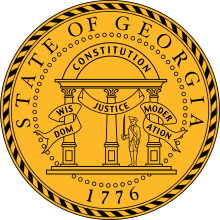United States House of Representatives elections in Georgia, 2018
| | ||||||||||||||||||||
| ||||||||||||||||||||
| ||||||||||||||||||||
| Elections in Georgia | ||||||||||
|---|---|---|---|---|---|---|---|---|---|---|
 | ||||||||||
|
||||||||||
The 2018 United States House of Representatives elections in Georgia will be held on November 6, 2018, to elect the fourteen U.S. Representatives from the state of Georgia, one from each of the state's fourteen congressional districts. The elections will coincide with a gubernatorial election, as well as other elections to the House of Representatives, elections to the United States Senate and various state and local elections.
District 1
The incumbent is Republican Buddy Carter, who has represented the district since 2015. Carter was re-elected unopposed in 2016.
District 2
The incumbent is Democrat Sanford Bishop, who has represented the district since 1993. Bishop was re-elected with 61% of the vote in 2016.
District 3
The incumbent is Republican Drew Ferguson, who will begin representing the district in 2017. Ferguson was elected with 68% of the vote in 2016.
District 4
The incumbent is Democratic Hank Johnson, who has represented the district since 2007. Johnson was re-elected with 76% of the vote in 2016.
District 5
The incumbent is Democratic John Lewis, who has represented the district since 1987. Lewis was re-elected with 84% of the vote in 2016.
District 6
The incumbent is Republican Tom Price, who has represented the district since 2005. Price was re-elected with 62% of the vote in 2016.
Price has been selected as United States Secretary of Health and Human Services in the Donald Trump administration.[1] If Price's nomination is confirmed, there will be a special election to elect a representative to serve the remainder of his term.
Republican State Senator Judson Hill has announced he is running for the potential special election for this seat.[2] Other potential Republican candidates include State Senator John Albers, State Senator Brandon Beach, former Secretary of State Karen Handel, businessman Cade Joiner, State Representative Jan Jones, immigration attorney Charles Kuck, Trump Diversity Coalition executive director Bruce LeVell, State Representative Chuck Martin, former State Senator Dan Moody, State Representative and wife of Congressman Price Betty Price and former Johns Creek Councilwoman Kelly Stewart.[3][4]
Potential Democratic candidates include State Representative Scott Holcomb, State Representatives Taylor Bennett and former State Representative and 2010 Attorney General candidate Rob Teilhet.[3][4]
District 7
The incumbent is Republican Rob Woodall, who has represented the district since 2011. Woodall was re-elected with 60% of the vote in 2016.
District 8
The incumbent is Republican Austin Scott, who has represented the district since 2011. Scott was re-elected with 68% of the vote in 2016.
District 9
The incumbent is Republican Doug Collins, who has represented northeastern Georgia since 2013. Collins was re-elected unopposed in 2016.
District 10
The incumbent is Republican Jody Hice, who has represented the district since 2015. Hice was re-elected unopposed in 2016.
District 11
The incumbent is Republican Barry Loudermilk, who has represented the district since 2015. Loudermilk was re-elected with 67% of the vote in 2016.
District 12
The incumbent is Republican Rick Allen, who has represented the district since 2015. Allen was re-elected with 62% of the vote in 2016.
District 13
The incumbent is Democrat David Scott, who has represented the district since 2003. Scott was re-elected unopposed in 2016.
During the 2016 election cycle, Scott endorsed Republican Senator Johnny Isakson for re-election and gave a $1,000 donation to Republican Utah Congresswoman Mia Love, leading to speculation that he could face a primary challenge in 2018.[5]
District 14
The incumbent is Republican Tom Graves, who has represented northwestern Georgia since 2010. Graves was re-elected unopposed in 2016.
References
- ↑ Pear, Robert (November 28, 2016). "Tom Price, Obamacare Critic, Is Trump's Choice for Health Secretary". The New York Times. Retrieved December 1, 2016.
- ↑ Bluestein, Greg (November 30, 2016). "Judson Hill becomes first Republican to enter race to replace Tom Price". The Atlanta Journal-Constitution. Retrieved December 1, 2016.
- 1 2 Bluestein, Greg (November 29, 2016). "Price's promotion sets off a scramble to fill his north Atlanta seat". The Atlanta Journal-Constitution. Retrieved December 1, 2016.
- 1 2 Pathé, Simone (November 29, 2016). "Special Election to Replace Price Could Present Opportunity for Georgia Democrats". Roll Call. Retrieved December 1, 2016.
- ↑ Nir, David (September 1, 2016). "Lousy Democrat David Scott gives $1,000 donation to vulnerable Republican congresswoman in Utah". Daily Kos Elections. Retrieved December 1, 2016.